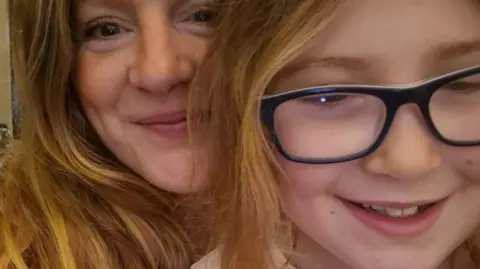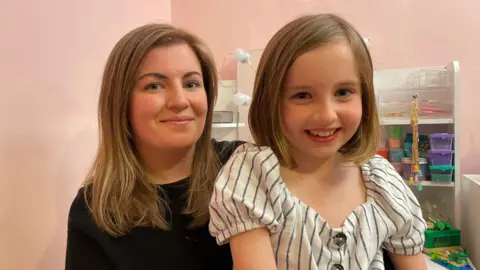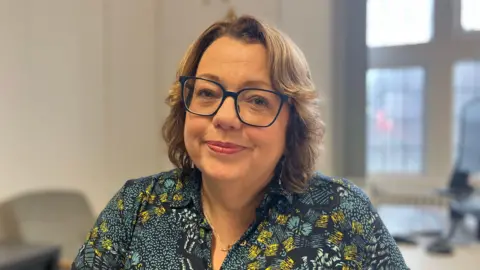Our soul-destroying wait for daughter's autism diagnosis
 Contributor picture
Contributor pictureA mother has described her daughter's three-year wait for an autism assessment as "soul-destroying".
Caroline, 48, from Pembrokeshire, said her daughter struggled to understand herself and could display challenging behaviour.
BBC News research suggests the number of children waiting more than a year to be assessed in Wales has doubled in the past three years.
The Welsh government said it would invest £13.7m in neurodivergence services and said long waits were "not acceptable".
Neurodivergence is an umbrella term that includes a number of conditions, including autism, attention deficit hyperactivity disorder (ADHD), dyslexia, and dyspraxia.
Caroline first asked her GP if her daughter, Lotus, could go on a waiting list for a diagnostic assessment for neurodivergence in December 2021.
More than three years later, the family is still waiting.
"[Lotus] struggles with understanding herself, and that then manifests into behaviours that a lot of people would think were not acceptable," Caroline said.
Lotus is also under-sensitive to pain and has to follow routines, Caroline said, adding she thinks about the waiting list every day.
'Hardest thing to watch her struggle'
"Until we actually know that she is autistic, it is very difficult to tailor your parenting to that," Caroline said.
"Although it is not a magic wand, a diagnosis for us would make our family life and her life, more importantly, so much easier.
"From what I have heard, the waiting lists are just getting longer and longer, and it's quite soul-destroying to not have anything close to rely on.
"The hardest thing is to watch your child struggle."

Gemma, from Brynamman, Carmarthenshire, said her daughter Alice, eight, had been waiting almost four years for an assessment, which made her feel "angry".
"You wouldn't expect anyone else to go through their whole childhood without having answers as to why they're suffering," she said.
"We're struggling to get her to school, she doesn't like going to school, it's full on school refusal. Noise is a big problem for her, she chews everything, she doesn't cope in crowds."
Gemma herself was diagnosed with autism a little over a year ago, and said things could have been different for her if she been diagnosed sooner.
"We speak to her, we're very honest about mental health and about autism, and we try and accommodate any sensory needs.
"But [a diagnosis] would give her that approval and that it's OK, the way she feels."
In response to both mothers, chief operating officer at Hywel Dda health board Andrew Carruthers said it was "constantly working to improve services" to ensure it sees as many of the young people who need help as soon as possible.
BBC Freedom of Information requests to health boards in Wales found an increase in the number of referrals for assessments, as well as a jump in how long children are waiting.
In Hywel Dda health board there had been a 12-fold increase in the number of children waiting more than a year for an autism assessment - from 194 children in 2019 to 2,391 in 2024.
Hywel Dda has also seen more than a 400% increase in the number of autism referrals received - 614 in 2019 compared with 3,326 in 2024.
One child in the Betsi Cadwaladr health board area has been waiting more than five-and-a-half years for an assessment, the figures showed.
In England, the children's commissioner warned last October hundreds of thousands of children with suspected neurodevelopmental conditions faced "unacceptably long" waits to be diagnosed.
Wales' health minister, Sarah Murphy, said the Welsh government had recently invested £13.7m into neurodivergence services, as well as £3m to tackle the longest waiting times, with six-month targets given to health boards.
"It's not acceptable that they've been waiting so long," Ms Murphy said.
"That's why we're giving this additional money. We cannot let this continue.
"The need has just shot up. There's just been a huge increase in awareness.
"That's why we've had to create a whole new model now for delivery."
The Wales Neurodivergence Service welcomed the investment but said that did not mean the work was over to tackle increased demand for assessments.

"It isn't as straightforward as employing a couple of more people. They have to have the right skills, knowledge experience, and then the extra training possibly," said the head of the service, Wendy Thomas.
"If you look at things like the legislation, a child doesn't have to have a diagnosis. There's work to do around how we can better meet those children's needs generally."
How to get help for neurodivergent children
If a parent or guardian thinks their child may be neurodivergent, the NHS in Wales suggests they speak to their school teacher or the designated special educational needs co-ordinator in that setting.
The NHS also advises going to your GP for support.
The Wales Neurodivergence Service said that parents should try to access support even before an assessment, with school being one avenue and local authorities another.
"If they have a positive or a negative assessment the child has the same needs at the end. So it's about what you do along that path," said Ms Thomas.
"If their child isn't sleeping – what can help that? Because just having a diagnostic assessment doesn't address that."
She said that this did not deny the "validity of a diagnosis", but stressed: "It shouldn't just be that".
Additional reporting: Lola Mayor and Steve Duffy
